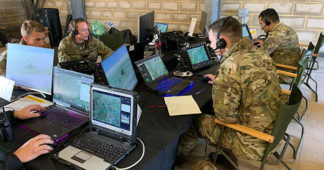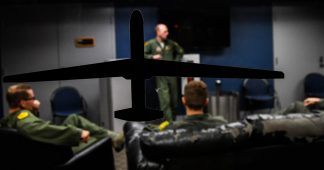Over the Mountains and Under the Radar: The Military-Industrial Complex in New Hampshire
By Joan Roelofs
New Hampshire, like many other states, is deeply penetrated by military culture, funding, and institutions. Yet its presence is hardly visible to many people. This is amazing, as the military-industrial complex that President Eisenhower warned us about was a mere fragment of its scope today.

Military contractor campaign donations, propaganda, and patriotism account for much of the support for our endless wars and preparation for them, costly in economic, environmental, and human ways. In addition, a multitude of interests sustains the military and its budget, and encourages silence about its wars of aggression and other activities.
The antiwar movement must contend with the many ordinary citizens who may have no desire to kill people, destroy the environment, or overthrow governments. They are trying to earn a living, fund their charitable organizations and schools, or save their communities from economic devastation. At present, without a national budget devoted to human needs, they see no other choice but to slip under the wings of the lush military budget.
The military contracts for almost everything. Along with other government enterprises, such as prisons and highways, this further ensures their survival while contributing to booming regional economies where unemployment levels are low.
F-35, BAE Systems and More
Readers of specialty publications, such as the NH Business Review, may learn that: “In New Hampshire, the F-35 program supports 55 suppliers—35 of which are small businesses—and over 900 direct jobs, much of them located at BAE Systems in Nashua. The F-35 program generates over $481 million in economic impact in the state” (9-21-17).
Incidentally, the F-35—considered the most expensive weapon in history—has been rated unfavorably by military experts.
The city of Nashua’s website informs us that BAE is the largest employer in the city and, in addition: “A total of 130 defense contractors were awarded contracts between 2000 and 2012, which is indicative of how robust the defense industry has become in Nashua.” Not coincidentally, Money magazine has rated Nashua as the best place to live.

The weapons manufacturers and their component suppliers dominate the manufacturing sector of the NH economy. BAE, a British corporation, has the largest slice of Department of Defense (DoD) contracts in NH, totaling more than $2 billion in the 21st century. The company is the premiere advanced weapons provider to the U.S. Navy.
Its products include advanced naval machine guns, electromagnetic railguns and hypervelocity projectiles along with tracked and wheeled armored combat vehicles, naval guns, artillery and missile launching systems, and advanced precision strike munitions and ordnance.
Other large NH weapons firms and their suppliers include: L3 Technologies, Impact Science and Technology, Kollsman (a subsidiary of Elbit, the Israeli firm that builds hi-tech walls), Timken, Northrop Grumman, and Lockheed (the latter two have subsidiaries here).[1]
The New Hampshire Aerospace & Defense Export Consortium boasts of its great success and significant growth in finding foreign markets for New Hampshire’s defense exports.

Nationally, multimillion and billion-dollar defense contracts also go to firms in information technology, intelligence, construction, remediation, and logistics (transportation, food, clothing, janitorial services, etc.).
Among the larger recipients in NH are Red River Technology (software maintenance), Warwick Mills (technical textiles), Environmental Alternatives (nuclear remediation), and C & S Wholesale Grocers (food and transport). The DoD, a larger economy than most nations, contracts out to every nook and cranny.
Medium and small businesses also received stimulation from its budget, such as Portsmouth Blind & Shade (window shades), Alan’s of Boscawen (meals), Velcro (hook and loop material), Univex Corporation (fat analyzing kit), and Monadnock Lifetime Products (disposable double handcuffs).
Green Feet Enterprises provided specialized mountain rescue training for Naval Special Operations Warfare. Child care centers, heating oil companies, landscapers, carpenters, appliance dealers, and others get some of the pie. This may explain the vast silence regarding the trillions spent.
The DoD has preferential provisions for contracts with small, disadvantaged, veteran-owned, service-disabled veteran-owned, woman-owned, minority-owned, American Indian-owned, or Black American-owned businesses, and also for firms in the AbilityOne Program or labor surplus areas.
Thus, out-of-state contractors may be used without meeting market efficiency standards. Silver Wolf Enterprises of Great Falls, Montana, an American Indian-owned business, provided “Microwaves” (contract description but apparently the kitchen equipment), to a site in Newington, NH.
The Pentagon, Non-Profits, and Higher Ed
For-profit businesses are not the only recipients of large DoD contracts. From 2000 to 2018, there were about 800 contracts and grants to NH non-profit organizations, state and local governments, higher education, and medical institutions. Many of the non-profits are research institutes, think tanks, or engineering firms, not charitable organizations.
For example, the Advanced Regenerative Manufacturing Institute had grants for $19m and $1.5m for biotechnology research, and Autonomous Undersea Systems had a $969,348 grant for research to improve naval operations. One of the grants to the Academy of Applied Science of Concord was for $11m, for basic research. The Student Conservation Association (a non-profit organization) has received many large DoD grants for construction monitoring, conservation work, and other activities.

Similar to the DoD contracts in the billions that Goodwill Industries receives nationwide for clothing and janitorial services, organizations that train and employ disabled people perform this type of work in NH. Northern New England Employment Services, with headquarters in Maine, had many contracts to supply workers for NH military sites. Industries for the Blind had contracts for furniture; CW Resources provided janitorial service in Portsmouth.
The University System of New Hampshire and Dartmouth participate in the DoD’s environmental research programs as well as others. Of the USNH contracts, one for nearly $2m, is to study “Seed dispersal networks and novel ecosystem functioning in Hawaii.” Dartmouth also receives grants for military medical research. The state’s universities and colleges are provided with tuition and fees for ROTC students.

In Keene, the Monadnock Economic Development Corporation is planning a joint project with Keene State College to create a “business hub” that will train students for work at BAE and other military contractors. Their announcements do not explain the nature of these businesses.

Defense Department Installations in the State
The State of NH receives support for National Guard facilities; one such grant was for $22,545,587. The Guard serves civilians in natural disasters, and more recently as a very efficient vaccination service. It is needed and appreciated here, but the other side of its service is deployment on overseas military adventures.

Towns and counties have DoD contracts to provide police protection, for example, to Army Engineers recreational and flood control sites. The militarization of police, such as the Bearcat of Keene, may also be noted.

The United States Army Corps of Engineers (USACE) performs much essential civilian work. In NH, it maintains many lovely lake sites for civilian recreation, and also awards subcontracts. For example, a local contractee is Bigg Dawg Landscaping of Weare, a woman-owned business providing janitorial service at Hopkinton-Everett Lakes. However, USACE is a DoD component and helps to mitigate criticism of it.

Children are fostered by the military in several ways. There is, of course, the national menu of war games: on TV and the computer, and at sporting events. Closer to home, military recruiters appear in high schools. Many children take the Armed Services Vocational Aptitude Battery (ASVAB); their names and results are sent to recruiters. Although it is possible to opt out of the testing, children and parents are often unaware of this.

There are about 10 high schools in NH with Junior Reserve Officers Training Corps (JROTC) programs, some with marksmanship activities. Most of those taking the training do not become officers, but they are indoctrinated in the military perspective and may become comfortable with violent solutions.

On November 1, 2017, the Keene Sentinel reported: “Plans for air marksmanship training in Fall Mountain cafeteria cause concern, by Meg McIntyre. LANGDON—A school board decision to allow JROTC air marksmanship training in the Fall Mountain Regional High School cafeteria has drawn concern from parents, prompting the district’s superintendent to put the training on hold. After considering every option, the school cafeteria was determined to be the best location for JROTC to conduct Air Rifle Marksmanship.” (Its usual venue was under construction.)
Philanthropy represents another stretch of the arms. The DoD itself donates surplus property to the Red Cross, Big Brothers/Big Sisters, Boys and Girls Clubs of America, Boy Scouts, Girl Scouts, Camp Fire, Little League Baseball, U.S. Olympic Committee, National Civilian Community Corps and others, and also participates in programs such as Boy Scouts’ encampment. The weapons contractors generously fund community organizations and take a particular interest in STEM (Science, Technology, Engineering and Math) education.
A popular robotics program in NH schools is FIRST (For Inspiration and Recognition of Science and Technology), a non-profit that aims to increase interest in STEM education. “BAE Systems, Inc. is proud to partner with FIRST® because we know that the hands-on experiences and life skills which students gain through FIRST®–including collaboration, critical thinking, communication, creativity and confidence—are necessary for our country, our communities, and even our own future workforce worldwide.”
Strategic Partners include Bechtel, Boeing, Booz Allen, GM, Lockheed, and United Technologies.

FIRST is also funded by the DoD and the New Hampshire Department of Education, which offers “grants to every public and charter school in New Hampshire to give every student a chance to be on a FIRST team.” “For grades 9-12, ages 14-18 the FIRST Robotics Competition provides for teams of students that build and program a robot to perform prescribed tasks against a field of competitors. . . . For grades K-4, ages 6-10 the G FIRST LEGO® League Jr. teams design and build a Team Model based on the Challenge, using LEGO® Education WeDo to program it to move.”
BAE has an additional program: “[I]n partnership with the University of New Hampshire, the ‘BAE Systems Summer STEM Scholar Program’ provided scholarships for 10 students to attend the university’s Tech Leaders camp. The project was designed and run by seven BAE Systems engineers, who also served as mentors for the students and provided insight on what it is like to have a career at BAE Systems.”

The pension fund for NH state government workers has been heavily invested in Microsoft and Cisco, major defense contractors. Churches, museums, and many non-profit organizations (as well as individuals) have investments in mutual funds that do very well with returns from military contractors.
Bought and Paid For
New Hampshire’s congressional representatives’ campaigns are funded by military contractors, and they have fruitful mutual relationships. Democratic Senator Jeanne Shaheen, for example, received $28,027 from BAE Systems in the 2020 election cycle.
A member of the Senate Armed Services and Foreign Relations Committees, Shaheen voted for record military budgets under the National Defense Authorization Acts, and for military intervention in Syria in September 2013.

Even if there were no campaign donations, every politician knows how important military spending is to the state’s economic survival. The NH Aerospace & Defense Export Consortium includes manufacturers, banks, non-profit organizations, universities, and local governments.
Recruiting Stations and Bases
Military institutions are well established in the Granite State. Recruiting stations are found throughout the state, as well as armories—many with lead contamination.
There are five military bases: Londonderry Army Reserve, New Boston Air Force Station, Air Force Active Newington, Pease ANGB Air Force Guard Portsmouth, and Somersworth USARC Army Reserve. New Boston and Pease are superfund sites now reported as clean.

Bases in the U.S. generally cannot be shown on a single printed map, as there are more than 4,000 of them.
They are economic hubs in their areas. Real estate, shopping, entertainment, restaurants, motels with housekeeping suites, car rentals, even museums, are advertised on base websites.
New Boston, a former bombing range, is now part of the Space Force, and uses a small area for “critical satellite command and control.” Other parts of the range, deemed clean, are available for recreation (for those with military connections), including rentals of cabins, kayaks, RV sites, party supplies, bikes, and bouncy castles.
The U.S. Department of Veterans Affairs and many non-profit organizations providing services or solidarity for veterans are also part of the military-industrial complex. While there are a few member organizations critical of our military operations, e.g., Veterans for Peace and About Face: Veterans Against the War!, most are strongly supportive.
Contractor philanthropy is especially directed to military charities. The corporation’s website states: “BAE Systems supports organizations that provide services to military members and their families, veterans, or operate in the security and intelligence fields or other military support functional areas.”
There is much more to the bootprint. Militarized police forces; board members of military contractors with educational, charitable, and political ties; board members of non-profits with military connections; and the old symbols of statues, parades, and glorification of our violent history in schools and speeches.
So many citizens are included, some happily, others because it is the best way to earn a living or keep a worthy organization afloat. This is not to blame them—almost all of us are connected in one way or another—but it helps to explain why there is so little protest about the military budget or the international predations of the military.
The DoD has spent trillions in the 21st century. Meanwhile, funds are lacking for support of essential infrastructure and social services—even in NH, one of the richest states in the richest nation.
Even more tragic is the history and future aim of the military’s mission: not to “defend” the nation, but to protect corporate “interests,” and to maintain “world supremacy,” even when that results in the murder of people, destruction of the environment, and obliteration of governments, in violation of U.S. laws, the U.S. Constitution, and international law.
- My information on contractors, obtained from the usaspending.gov database of federal contracts, covers approximately the period from 2000 to 2018. ↑
Published at covertactionmagazine.com
We remind our readers that publication of articles on our site does not mean that we agree with what is written. Our policy is to publish anything which we consider of interest, so as to assist our readers in forming their opinions. Sometimes we even publish articles with which we totally disagree, since we believe it is important for our readers to be informed on as wide a spectrum of views as possible.











